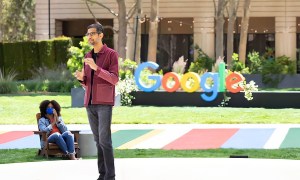

Today Google held a workshop to show would-be developers how to hack Glass and begin to develop applications for the wearable device. Google may not be encouraging the activity, but it seems to be very open-minded about the idea.
The session was called “Voiding Your Warranty: Hacking Glass” and involved two Google engineers walking a group of developers through the steps to root Glass, which basically means gaining deep software access that will void the warranty.
The engineers leading the lecture, Hyunyoung Song and P.Y. Laligand, showed everyone present how to program the device the safe way that will keep the warranty intact. Among the features shown was the ability to connect a computer to Glass via Bluetooth for installing some choice apps. It was also mentioned that a particularly crafty developer is actually able to code using Google Glass with a terminal emulator and set of scripts from the Play Store.
After that, the hacking began and the two engineers showed the attentive group how to gain root access to Glass and void their warranties in the process. The room was warned that rooting the device would also make it difficult to gain access to software updates when they become available. Just like on any Android device, the process erases all user data and removes all security precautions.
It was made clear as well that Googlers don’t exactly recommend rooting, instead thinking of it as a way for developers to “play around and go crazy.”
This is weird, but Google repeatedly showed Google Glass being blended in a blender during the question period. If the goal of this was to fill the online audience with rage and disbelief at seeing a beloved gadget destroyed, then it worked. Too well. More likely, however, the video was meant to represent what would happen if rooting your device went horribly wrong.
A great question was asked near the end, about whether or not Google had any plans to implement a password on Glass to prevent other people from accessing your information. The answer is that the Explorer edition (the version of Glass out in the wild now) probably won’t see additional security features, but the consumer version will.

